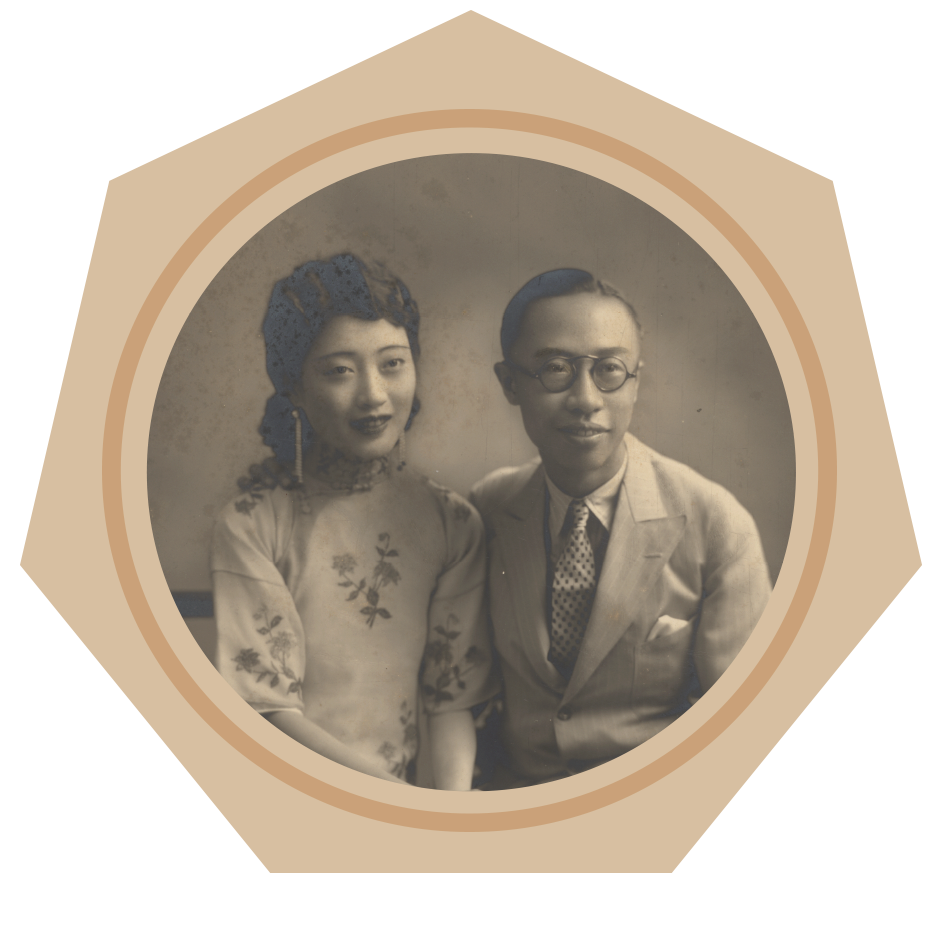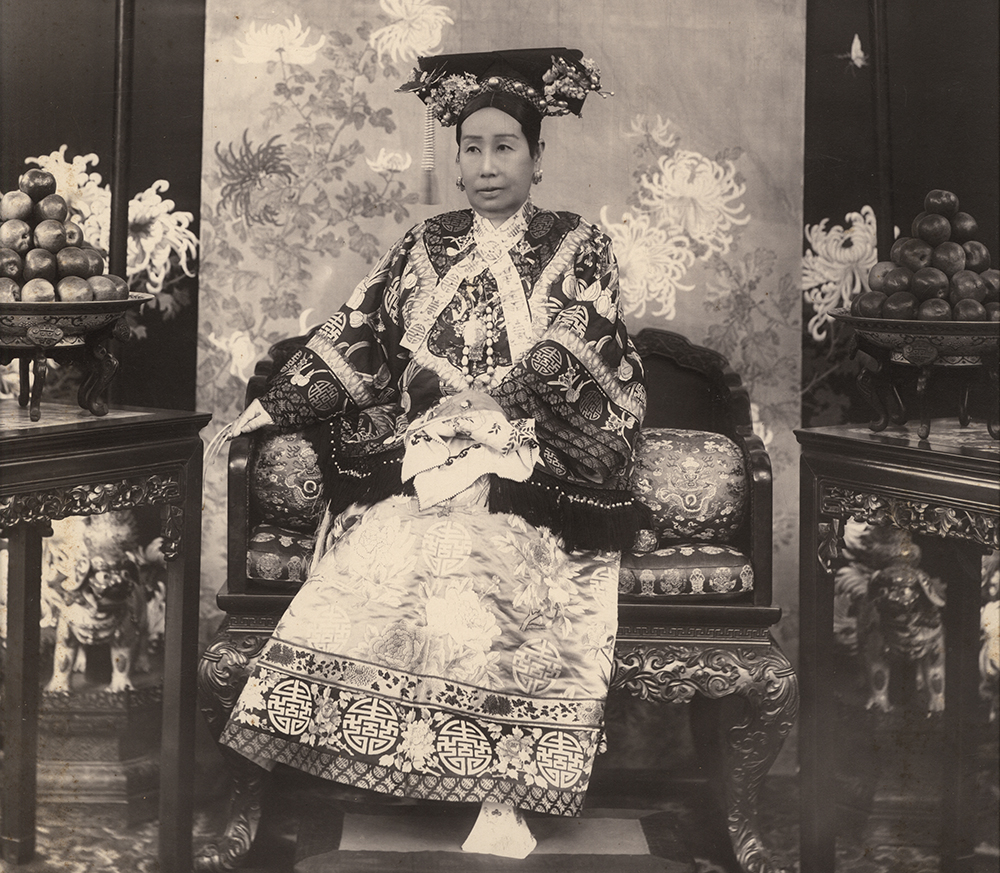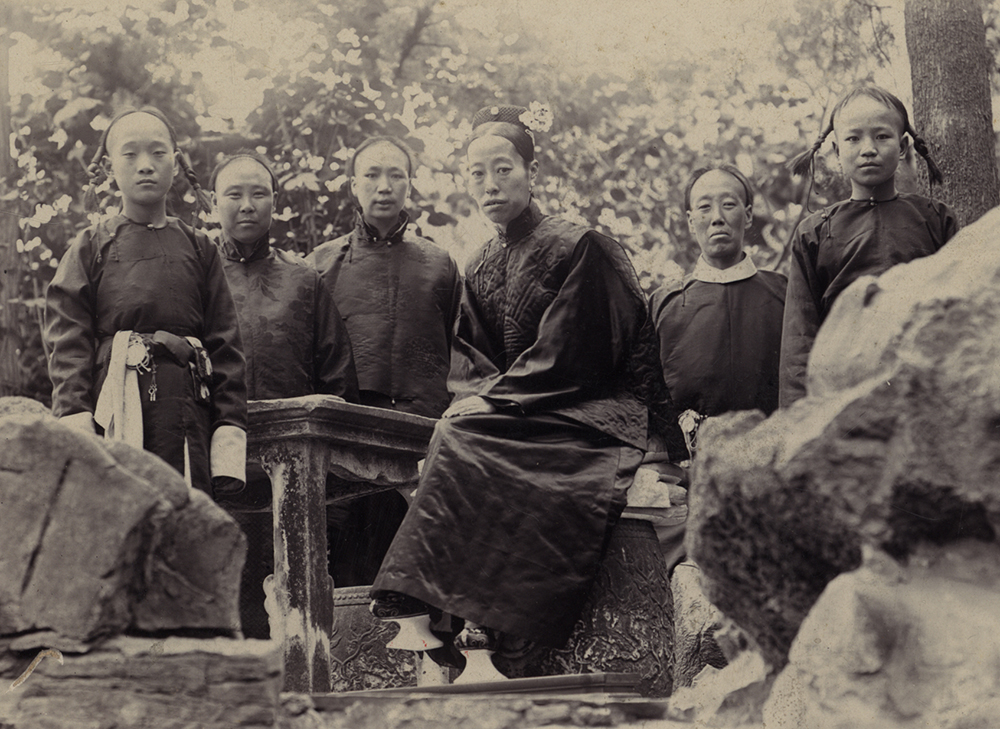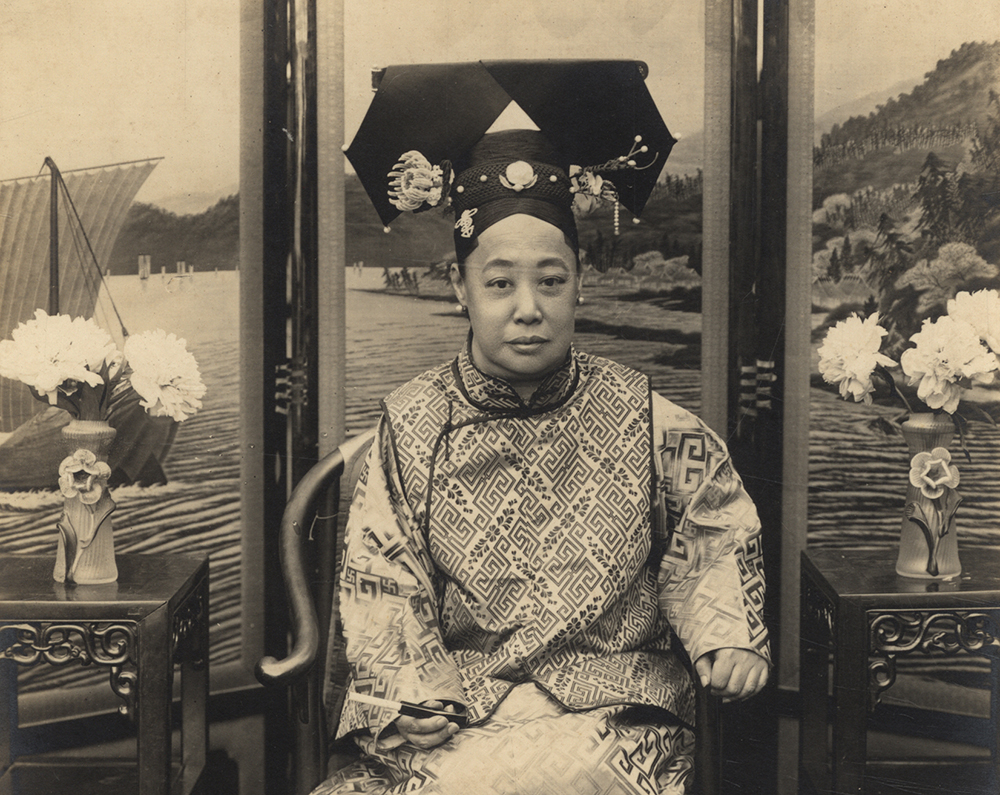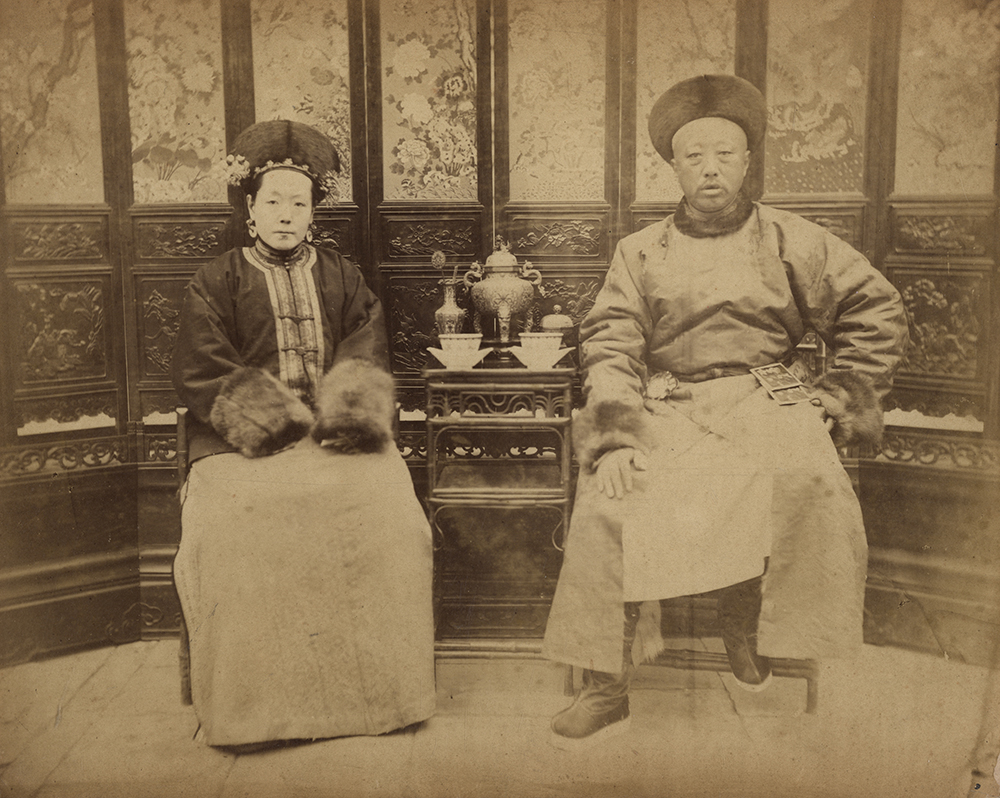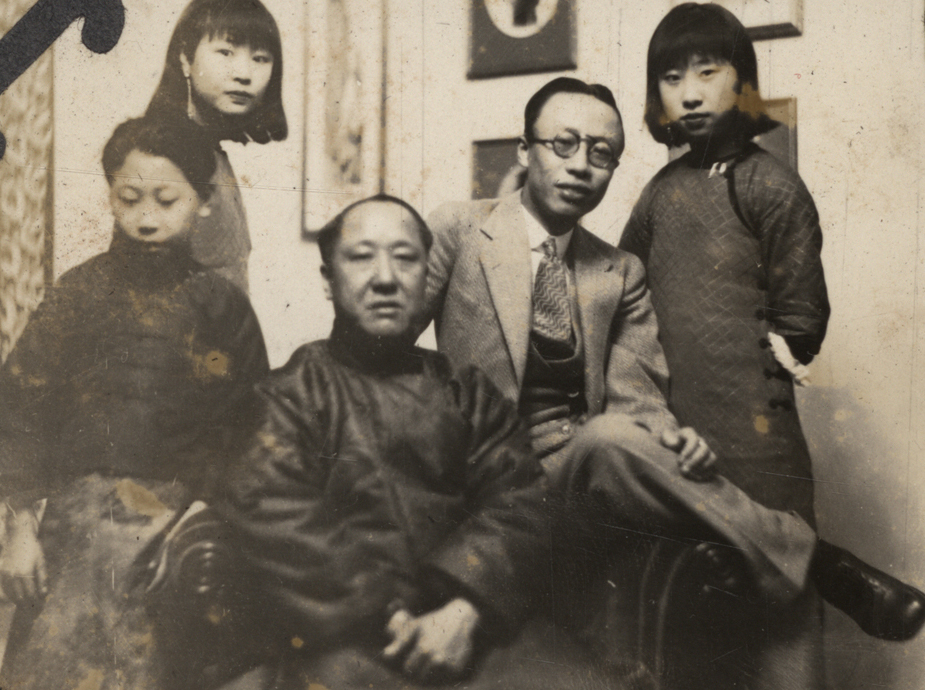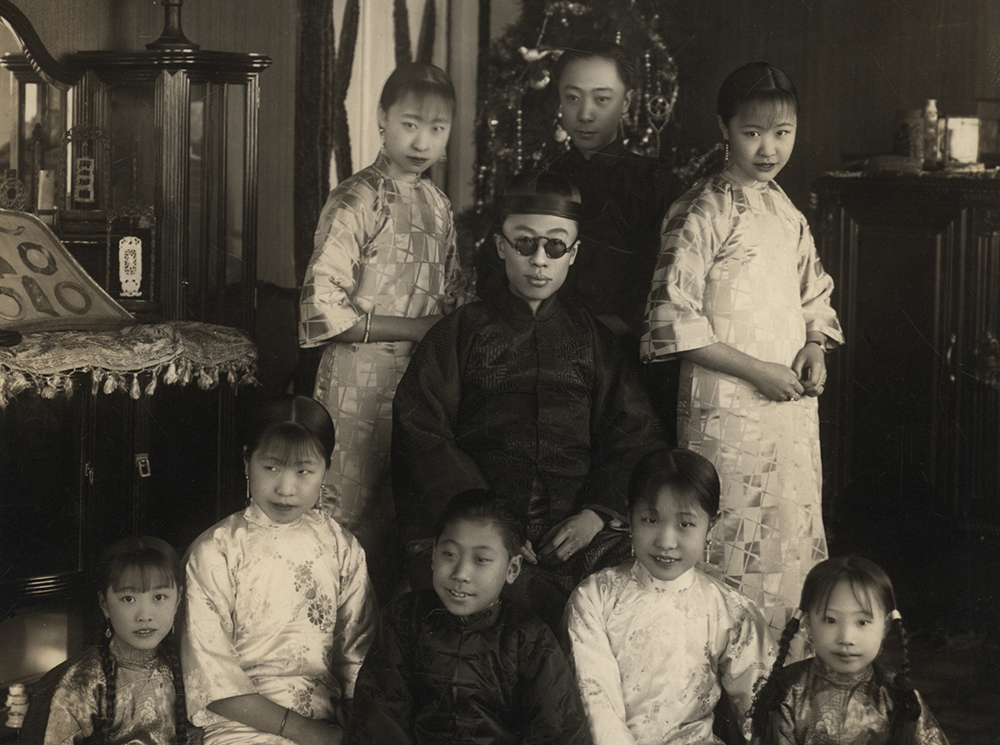Photography was brought to China in the mid-19th century, and it quickly became a trendy fad amongst the populace and within the imperial household and the aristocratic circle. Photography was no longer considered a soul-snaring witchcraft. Instead, with the taboo dispersed, the Chinese went to photographic studios or hired photographers to have their portraits taken, capturing the eternal moment with the lens of the camera. The surviving portraits, costumes photos, and snapshots of daily lives of the members of the Qing imperial household attest to their keen interest in photography.
This section provides a range of pictures from individual and family portraits of Empress Dowager Cixi (1835-1908), empresses and consorts, princes and lords, as well as imperial wives and princesses. During the Guangxu and Xuantong reigns (1871-1912) photographs gradually replaced paintings as the portrait representation of imperial figures. Some of the photos were commissioned to illustrate their awe-inspiring presence, or to be presented to foreign leaders and envoys as diplomatic gifts.
Empress Dowager Cixi
- 1904
- Courtesy of the Palace Museum, Beijing
The Empress Dowager Cixi, lineage name Yehenara (1835-1908) and given name Xingzhen, was born a member of the Bordered Blue Banner clan. In the 11th year of Emperor Xianfeng's reign (1861), alongside the enthronement of Emperor Tongzhi, Cixi was promoted to the status of empress dowager and elevated to the Bordered Yellow Banner clan. Her father Huizheng (1805-1896) was a daoyuan (local government official) of Taiguangdao in Ningchi, Anhui, and her mother was Lady Fucha. Cixi had three younger brothers and one younger sister. Her sister Wanzhen was wedded to Yixuan (1840-1891), Prince Chun of the First Rank, through arranged marriage during the reign of Xianfeng Emperor (1851-1861), making her the difujin (the prince's principal wife).
During the 2nd year of Emperor Xianfeng's reign (1852), the 18-year-old Cixi was chosen during the consort selection process for the Qing Palace. She remained there until her death at the age of 74. Having given birth to Emperor Tongzhi (1856-1875), Cixi controlled the political regime over a long period of 48 years, making her one of the important figures in the political scene of the late Qing dynasty.
After the signing of the Boxer Protocol in the 27th year of Emperor Guangxu's reign (1901), Empress Dowager Cixi was keen on improving relations with foreign powers. During the 29th year of Emperor Guangxu's reign (1903), when Chinese ambassador to France Yu Geng (?-1905) and his family returned to China following the completion of his mission, Cixi requested his eldest son Xunling to do a number of portrait shots for her. Because of this, Xunling became the imperial photographer for the Empress Dowager. The Palace Museum in Beijing currently holds over seven hundred photographs of Empress Dowager Cixi; most of these works were taken by Xunling. The majority of the photographs showcased in this exhibition were taken between the 29th and the 30th year of Emperor Guangxu's reign (1904). They include personal portraits of the Empress Dowager herself, as well as group photos and shots of her dressed up in the costume of the Goddess Guanyin. With the exceptions of portrait shots which ended up in the Empress Dowager's personal collection, some of the photos were presented to foreign envoys and head of states as gifts, while others were sold by photographic studios in the private sector.
Empress Dowager Longyu
- Late Qing
- Courtesy of the Palace Museum, Beijing
Empress Dowager Longyu (1868-1913), lineage name Yehenara and given name Jingfen, was the second daughter of Empress Dowager Cixi's third younger brother Guixiang (1849-1913). She also had a younger sister named Jingfang. In the 14th year of Emperor Guangxu's Reign (1888), she was chosen as empress consort through arrangements by Empress Dowager Longyu and married Emperor Guangxu the following year. According to the family lineage, Lady Nara is the niece of Empress Dowager Cixi and the cousin of Emperor Guangxu, who was four years her junior. Being a marriage stemming from political considerations the relationship of the couple was troubled and rocky. The two were cold and indifferent to each other for a long period of time.
With the death of Emperor Guangxu in the 34th year of his reign (1908), Puyi (1906-1967) ascended the throne as Emperor Xuantong. The empress became an empress dowager and received the honorable title "Longyu." Despite her new position as the Empress Dowager, Longyu's indecisive nature and her lack of personal stance placed her under the heavy influence of her favored court eunuch Zhang Delan. The occurrence of the Xinhai Rebellion led Empress Dowager Longyu to believe that all had been lost. Under the threat and enticement by both Yuan Shikai (1859-1916) and Zhang Delan, she reluctantly accepted the Articles of Favorable Treatment of the Qing Imperial Household proposed by the government of the Republic, and signed the edict of abdication. Overcame by grief and regret, she passed away at the age of 46. These images, taken during Emperor Xuantong's reign, show Empress Dowager Longyu spending her leisure time in the gardens of the Forbidden City.
Dowager Consort Duankang
- Early 20th century
- Courtesy of the Palace Museum, Beijing
Dowager Consort Duankang (1874-1924), also known as Consort Jin, was the concubine of Emperor Guangxu. She was a member of the Tatara clan, which belonged to the Manchu Bordered Red Banner. She was the eldest daughter of the Vice Minister of Rites Chang Xu, and her younger sister was Consort Zhen (1876-1900). In the 14th year of Emperor Guangxu's reign (1889), she was chosen as Imperial Concubine Jin. In the following year, she moved into the Yonghegong Palace, one of the Six Eastern Palaces. In the first month of the 20th year of Emperor Guangxu's reign (1894), she was promoted to the status of Consort Jin. In the first year of Emperor Xuantong's reign (1909), she was named Noble Consort Jin of the Emperor Father. Following the death of Empress Dowager Longyu in 1913, Consort Jin acquired the new title of Dowager Consort Duankang, and was assigned the duty of managing harem affairs of Puyi's little court by the Beiyang Government.
In Puyi's little court Duankang tried to emulate Empress Dowager Cixi in the handling of court affairs. On one hand, she had absolute control of the inner court of the Forbidden City; on the other hand, she tried to win over the support of Lady Guwalgiya (?-1921), the difujin of Prince Chu of the First Rank. However, as Puyi grew older, her relationship with the young emperor is in no way comparable to that between Empress Dowager Cixi and Emperor Guangxu. Furthermore, with rapid changes in imperial political landscape during the early years of the Republic, she was forced to give up her ambition and resigned herself to leading a reclusive life.
Prince Chun of the First Rank and His Difujin
- Late Qing
- Courtesy of the Palace Museum, Beijing
Yixuan (1840-1891), lineage name Aisin Gioro and courtesy name Puan, was the seventh son of Emperor Daoguang (1821-1850). With the enthronement of Emperor Xianfeng, he was promoted to Prince Chun of the Second Rank. In the 11th year of Emperor Tongzhi's reign (1872), he was further elevated to Prince of the First Rank. He was also the father and grandfather of Guangxu and Xuantong emperors, respectively. The prince played an important role in politics, as well as government and military reforms during the late Qing dynasty.
Yixuan had one principal wife and three secondary spouses. His difujin Lady Yehenara (1841-1896), personal name Wanzhen, is the sister of the Empress Dowager Cixi. Their marriage was designated by the Xianfeng Emperor himself in the 10th year of his reign (1860). After their marriage, the couples got along well and had four children. Their second child was Emperor Guangxu (1871-1908), personal name Zaitan. Unfortunately, all their other children passed away at a young age.
Zaifeng and Members of His Family
- Early Republic
- Courtesy of the Palace Museum, Beijing
Zaifeng, courtesy name Yiyun, was born at the Prince Chun's Mansion in Taipinghu. His mother was Lady Liujia, the cefujin of Yixuan. Due to his love for collecting books, he gave himself the nickname shuchi (literally book addict). In the 15th year of Emperor Guangxu's reign (1889), the title of Enzhen Guogong was bestowed upon him. Following the death of Yixuan, he inherited the hereditary position of Prince Chu of the First Rank. In the 27th year of Emperor Guangxu's reign (1901), he served as a special envoy and traveled to Germany to deliver the apology on behalf of the imperial court in the aftermath of the Boxer Rebellion. After the death of Emperor Guangxu in the 34th year of his reign (1909), his eldest son Puyi was summoned to the palace, inheriting the throne at the tender age of 3. Zaifeng himself was appointed Prince-Regent and ruled over the court.
In the 28th year of Emperor Guangxu's reign (1902), Zaifeng was ordered by Empress Dowager Cixi to take Lady Guwalgiya, the daughter of the Grand Secretary Ronglu, as his wife. Puyi was the couples' oldest son. In 1913, he took Lady Dengiya as his cefujin. Zaifeng had a total of four sons and seven daughters. With the exceptions of his third son Puqi (1915-1918) who died at a young age and his oldest daughter Yunying (1908-1925) who succumbed to illness at the age of 18, his remaining sons and daughters would accompany him and his eldest son as they weathered the political turmoil in the early years of the Republic.
Throughout his life, Zaifeng's personality can be best described as weak and indecisive. However, he is a sincere and honest individual. During his years as the Prince-Regent, he kept to his duties and faithfully implemented the reform policies of the late Qing. He pushed for a constitutional monarchy, promoted industrial development, and brought discipline to both the army and the political scene. Yet, he was unable to reverse the tides of decay engulfing the Qing Empire. With corrupt officials dominating the political scene and foreign powers threatening the empire from all sides, Zaifeng's lack of skills as a Prince-Regent made him powerless and far removed from changes in the political scene, despite his key position in the government. His only sense of comfort and security came from his family, in the haven where he would be accompanied by his children.
